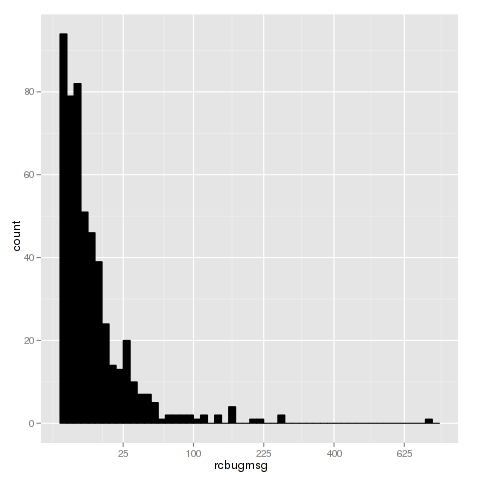
Update for 06/10/2012
Well I had not written the weekly work log for the last week that
is because the week was short (oh yeah thanks to all these bandhs
our week got fluctuated and to be frank the week was only 4 days
long) and second was my lazyness. Here goes the update
* After a long discussion with
Aravinda on
"why productivity is reducing these days." We concluded the social
network is eating up most of time. So decision was made and I closed
all pinned tabs for Twitter Gmail Identi.ca and Friendica on my browser
* After the above resolution I finished almost 4 chapters of
Moder Perl
within 2 hours!. Indeed Social networks kill the productivity.
Update for 13/10/2012
I've really fallen in love with computerised bots, thanks to the wonderful
KGB bot :-). So majority of my work on this week is on bots.
Jabber Dictionary Redesign
After thinking for a while I decided to re-write the
dictionary bot
which when release got an overwhelming response as see in the comments of
above link. Few reason for re-write
- Generalise the bot framework so single bot can handle multiple languages
- Improve the data collection on bot side
- Current code base was not very well organised and trying to add more feature it had become messy.
- Provide XEP support to help in data collections
Few changes which are already implemented include
- New code is now using pyxmpp2 library instead of GPLed xmppy used by current
code.
- Implemented XEP-0071 extension to properly format the meaning display by the bot
- Current implementation was displaying all words in one set without distinguishing
between adjectives,verbs proverbs etc. even though wiktionary displays meaning based
on this. New implementation gives out meaning in same format as it is displayed on
wiktionary.
Things remaining todo
- Separating wiktionary parsing logic from bot code by providing some sort of intermediate
interface between bot and wiktionary parsers.
- Adding more language wiktionary parsers and teaching the bot to become multilingual :-)
- Integrating XEP-0004 (Data Forms) for taking the meaning input from user. Current code
requires user to enter data in particular format
suckless-tools fix for Wheezy
Jakub Wilk suggested me to prepare a minimal version of suckless-tools for Wheezy which includes
a patch to the bug
#685611. And few minor changes which involve
taking over the package and fixes in copyright file other than above mentioned bug. Hopefully
release-team will be okay with these changes. I'm waiting for the upload to file an unblock-request.
I did face a problem I was halfway through wit suckless-tools_39-1 when Jakub asked me about this
change and current repository was fresh one prepared for 39-1 and didn't have history for 38 version.
First I thought of preparing separate repository for 38 version which was not an correct option,
but I even couldn't play with current repository. So finally I renamed current version of repository
to suckless-tools-39.git on collab-maint and prepared fresh repository suckless-tools.git basing
it on 38-1 version.
From 39 version suckless-tools will be following 3.0 (quilt) source format and will not be working
with git-buildpackage as the tool can't handle multi-tarball packages. Yes every tool involved in
the package will have separate tarball from 39.
More work on Bots
Well today I again worked on Jabber bot, but not the dictionary bot. This time its an SMS Gateway
bot for
Jonas Smedegard and the coding was done in Perl. Thanks to jonas I finally could apply
what I learnt in Perl. Code may not be very elegant but it works :-).
And after hacking one full day in Perl now I'm not feeling very much interested to go back and
hack on my own Python based dictionary bot :-). But I will anyway.
Misc
- fonts-kalapi has been uploaded to unstable by Kartik finally :-). Only sad part is he couldn't
use the home grown dh-make-font for this purpose.
- Finally Kartik is here in Bangalore and I'm just waiting when I can meet him.
- I ordered a RaspberryPi once it comes some hacking will be done on boxer again :-)
- Watched couple of Star Wars movie :-) (Still have 4 left)
- Expendables 2 movie is in watch list after this post.
So that's it folks. Quite longish post hope you are not bored reading it :-). Well time for movie
C'ya all with next weeks log.
 The
The  As the first and third quantile are close together we can assume that the majority of the work is done by a few, especially since the second quantile is 5. This is supported by the histogram below, where the x axis is the number of recorded messages and y is the number of developers.
As the first and third quantile are close together we can assume that the majority of the work is done by a few, especially since the second quantile is 5. This is supported by the histogram below, where the x axis is the number of recorded messages and y is the number of developers.

 Big release notes since 1.0:
We ve got a new list
Big release notes since 1.0:
We ve got a new list  The last week was quite productive as I was on vacation and at home town but sadly I
couldn't complete this post so again merging the work with this week but this week ain't
much productive as I was tired from journey back and didn't get enough time to recover.
So here it goes.
Debian Related
The last week was quite productive as I was on vacation and at home town but sadly I
couldn't complete this post so again merging the work with this week but this week ain't
much productive as I was tired from journey back and didn't get enough time to recover.
So here it goes.
Debian Related
 here's the short overview about my activities around release-critical bugs
for the last week:
here's the short overview about my activities around release-critical bugs
for the last week: